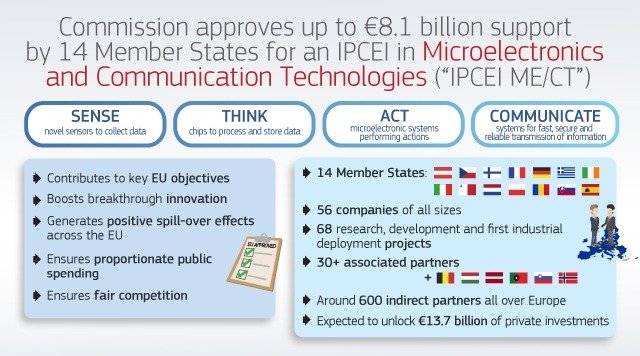Fourteen European Union countries will grant up to 8.1 billion euros ($8.7 billion) in public support to 56 companies working together on projects in microelectronics and communication technologies, the European Commission said.
 The projects concern research and development projects covering microelectronics and communication technologies across the value chain from materials and tools to the chip designs and manufacturing processes, the EU executive said.
The projects concern research and development projects covering microelectronics and communication technologies across the value chain from materials and tools to the chip designs and manufacturing processes, the EU executive said.
Airbus, ASML, Ericsson, Orange, Analog Devices, Bosch, Renault, STMicroelectronics, NXP Semiconductor, Infineon and GlobalFoundries, among others, are taking part in the projects.
European Commission in a statement said that the project, called “IPCEI ME/CT”, was prepared and notified by fourteen Member States: Austria, Czechia, Finland, France, Germany, Greece, Ireland, Italy, Malta, the Netherlands, Poland, Romania, Slovakia and Spain.
The member states will provide up to €8.1 billion in public funding, which is expected to unlock additional €13.7 billion in private investments. As part of this IPCEI, 56 companies, including small and medium-sized enterprises (SMEs) and start-ups, will undertake 68 projects.
The IPCEI ME/CT concerns research and development projects covering microelectronics and communication technologies across the whole value chain from materials and tools to the chip designs and manufacturing processes.
These projects aim at enabling the digital and green transformation by: (i) creating innovative microelectronics and communication solutions, and (ii) developing energy-efficient and resource-saving electronics systems and manufacturing methods.
They will contribute to the technological advancement of many sectors, including communications (5G and 6G), autonomous driving, artificial intelligence and quantum computing. They will support companies active in the energy generation, distribution and use in their green transition.
First novel products may be introduced to the market as early as 2025 and the completion of the project is planned for 2032. Around 8.700 direct jobs are expected to be created, and many more indirect ones.
